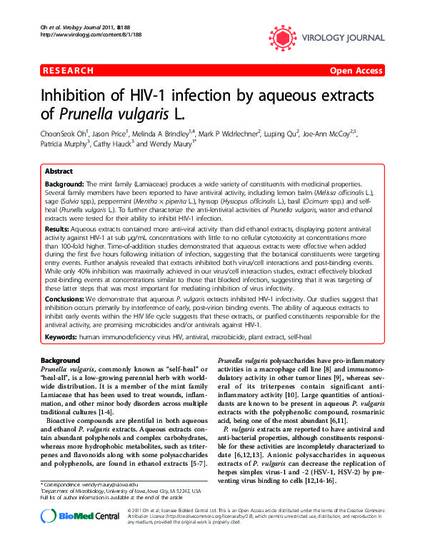
Background
The mint family (Lamiaceae) produces a wide variety of constituents with medicinal properties. Several family members have been reported to have antiviral activity, including lemon balm (Melissa officinalis L.), sage (Salvia spp.), peppermint (Mentha × piperita L.), hyssop (Hyssopus officinalis L.), basil (Ocimum spp.) and self-heal (Prunella vulgaris L.). To further characterize the anti-lentiviral activities of Prunella vulgaris, water and ethanol extracts were tested for their ability to inhibit HIV-1 infection. Results
Aqueous extracts contained more anti-viral activity than did ethanol extracts, displaying potent antiviral activity against HIV-1 at sub μg/mL concentrations with little to no cellular cytotoxicity at concentrations more than 100-fold higher. Time-of-addition studies demonstrated that aqueous extracts were effective when added during the first five hours following initiation of infection, suggesting that the botanical constituents were targeting entry events. Further analysis revealed that extracts inhibited both virus/cell interactions and post-binding events. While only 40% inhibition was maximally achieved in our virus/cell interaction studies, extract effectively blocked post-binding events at concentrations similar to those that blocked infection, suggesting that it was targeting of these latter steps that was most important for mediating inhibition of virus infectivity. Conclusions
We demonstrate that aqueous P. vulgaris extracts inhibited HIV-1 infectivity. Our studies suggest that inhibition occurs primarily by interference of early, post-virion binding events. The ability of aqueous extracts to inhibit early events within the HIV life cycle suggests that these extracts, or purified constituents responsible for the antiviral activity, are promising microbicides and/or antivirals against HIV-1.
Available at: http://works.bepress.com/mark_widrlechner/41/

This article is from Virology Journal 2011 (8): 188, doi:10.1186/1743-422X-8-188.